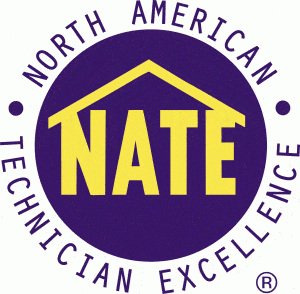The HVAC industry employs over 376,800 people in the US (source bls.gov). The services of HVAC engineers and technicians are in demand. The demand will continue to grow as the complexity of HVAC systems grows. HVAC technicians need to skill up to meet this growing demand.
As an HVAC technician, you can achieve a better salary and working conditions if you are certified. Although not mandatory in every state (requirements vary locally and between states), certification presents several benefits for you as a technician.
EPA 608 Certification: Everything You Need to KnowThis article will inform you on the following:
- The advantages of achieving certification
- The different types of certification
- What you need to do to become certified
- The certification programs available
- The exams you will need to pass
- How to prepare for and ace your certification exam
After reading this article, you will be convinced of the benefits of being certified, not just for your career, but your family too. Also, you will be able to chart the path you need to follow to obtain certification. You will also be ready to make the decision to choose the right program to suit your career ambitions.
What is an HVAC Certification License?
HVAC certification licenses means HVAC technicians are trained and qualified enough to perform installation and repair tasks within their state. Technicians can become certified after passing exams that test a technician’s knowledge of the trade.
There are three types of certifications that HVAC technicians can obtain as professionals. Some states require technicians to become licensed and certified by passing exams, and the federal government regulates certification in the Code of Federal Regulations Section 608 of the Clean Air Act.
Some states require technicians to take tests to demonstrate their proficiency and knowledge of the trade before being able to practice as a journeyman. Additionally, the North American Technical Excellence (NATE) is a primary organization certifies technicians. HVAC Excellence is another agency that is accredited as reputable among those in the industry. After completing an approved course of study or an apprenticeship, a technician may take the exam to become certified. HVAC Excellence certification is another body that certifies HVAC technicians as proficient and highly qualified.
In addition to the NATE and HVAC Excellence, there is a federal certification that HVAC technicians must obtain. HVAC technicians must be certified by the Environmental Protection Agency to purchase refrigerants and dispose of them. Having the knowledge required for passing the exam is critical to being able to do the job properly.
The Benefits of Becoming a Certified HVAC Technician
So why should you become a certified HVAC technician?
Here's some of the benefits to becoming certified:
- You gain a competitive advantage over other HVAC technicians in the job market
- You increase your earning potential as some organizations will pay certified technicians more
- Your exposure to bigger projects and demanding roles increases as you demonstrate your competencies
- If you decide to start your own HVAC business, your certification will help show potential clients you mean business
- It validates your knowledge as a technician, giving employers or clients peace of mind.
As a growing industry, the HVAC industry continues to attract more people into the industry. At some point in the future, there may well be a surplus of qualified HVAC technicians. This is where getting certified puts you ahead of the competition. Now that you know the advantages of getting certified, read on to find out how you get certified, and the different types of certifications available to you.
Working for Yourself as an HVAC Contractor
If you’re ready to work for yourself - either alone or with your own employees - it’s time to consider becoming a contractor.
In some states, only contractors are required to have an HVAC license. They can supervise their employees who are also working on HVAC systems. In other states, the contractor needs to employ a “qualifier” - someone who is certified and licensed under state law. As long that person is employee and their licensing is up-to-date, the contractor can undertake HVAC work. That “qualifier” just needs to supervise the HVAC part of it.

In addition to having HVAC knowledge, a contractor also has to know about business law for his region. Since being a contractor meanings running your own business, you’re also responsible for bookkeeping, paying payroll taxes, business licenses and everything else your local or state government requires.
The contractor’s license usually requires an HVAC knowledge exam as well as a business exam. You can check under your state for more information.
How to Become Certified - HVAC License Requirements
Here's how to get HVAC certified:
- Earn a high school diploma or GED equivalent (depends on your state)
- Receive an HVAC certificate from an accredited trade school or program (depends on your state)
- Obtain your HVAC licence from the state you plan on working in
- Pass certification exams for different types of HVAC careers
With qualifications and experience, getting your certification is easier than many HVAC technicians think. Whether you got your start in the industry by attending college and receiving a leaving certificate or associate degree, or you took the apprenticeship route, you can become certified.
There are a number of certification bodies operating in the US. For nearly all of them, you will need to take a course, either through self-study or via an accredited institution. The contents of each of these courses will differ, depending on the type of certification you want to achieve.
You will also need to sit and pass an exam for you to achieve certified status. The next section goes into a bit more detail about the different types available and the differences between them.
The Different Types of HVAC Certificates
Here's a summary of the different types of HVAC certifications:
- EPA Type I Certification - For Servicing Small Appliances
- EPA Type II Certification - For Servicing High Pressure Systems
- EPA Type III Certification - For Servicing Low Pressure Systems
- Universal EPA Certificate
- North American Technician Excellence (NATE)
We mentioned above that there are different types of HVAC certification available, and now you get to know what they are. They are all important because different states have different licensing requirements for HVAC technicians. However, one of these is recognized across all the states of the country, and that’s the one we will begin with.
Section 608 Technician Certification
It is common to refer to this certification as the EPA HVAC certification and we will use that name in this article. The Environmental Protection Agency (EPA) requires everyone with access to a system or container storing refrigerant gas (think R22 or R410A).
As an HVAC Technician, you handle these gases regularly during servicing, system regassing or repairs. It is mandatory that you hold this certificate. There are four types of certifications available under Section 608, each requiring a course of study and an exam to achieve certification. Each of these four types of technician certifications are detailed below.
EPA Type I Certification - For Servicing Small Appliances
If your job restricts you to servicing and repairing small refrigerant containing systems, all you need is to study for the Type I certification. The course and exams covers topics which include:
- The definition of a small appliance, examples include a small window AC unit, typically containing less than 5 kg of gas.
- System evacuation using the appropriate equipment.
- Gas recovery techniques for systems with or without a working compressor.
- Safety considerations when handling refrigerants.
You must pass an approved test to achieve this certification.
EPA Type II Certification - For Servicing High Pressure Systems
For any work involving high pressure systems, you will need to possess the EPA Type II certificate. The process is generally the same, you study the course material, check out our EPA Type II practice test, and then you sit an exam. The topics covered here will include some of the following:
- Detecting leaks in high pressure systems.
- Why you need to leak test before repair or system recharging.
- Leak repair requirements for systems containing more than 50 pounds of refrigerant.
- Recovery techniques and good practice.
- Recovery requirements for repairs, disposal, carrying out “major” repairs etc.
- Understanding high pressure refrigeration systems and gases.
- Safety and safe use of equipment.
A course of self-study is followed by taking an exam to get certified. Depending on how quickly you want certification, and the time you have available for study, attending a class may be a better option than self-study or distance learning.
EPA Type III Certification - For Servicing Low Pressure Systems
This type of certification covers more or less the same topics as the Type II, but for low pressure systems. If you have the experience of working on low pressure systems, the certification process may just be an opportunity to refresh your theoretical knowledge. Passing the exam is required to achieve the Type III certificate. Check out our EPA Type III practice exam here.
Universal EPA Certificate
To achieve this certificate, you will learn the information covered in the three other types of certifications. The universal certificate allows you to work on all types of system, and is the recommended route to take because it opens up your options when it comes to finding work.
This certification may take slightly longer to study for due to the amount of material you will need to cover. Achieving this certification will allow you to work in any state in the US, considering you meet the other relevant state and local licensing requirements for HVAC technicians.
North American Technician Excellence (NATE)
NATE is non-profit organization offering nationally recognized certification programs for HVACR technicians. Becoming an HVAC technician does not require a certification, however it does have its benefits. The practical nature of the NATE certification process makes it the ideal qualification for technicians looking to validate your knowledge.



The exams are split between experienced and newly-qualified technicians to reflect how thorough NATE are with the process. Each level has a knowledge-based exam that takes into account your experience. The other element that sets apart the NATE certification from other certification types is the division of the exams into different specialties such as air conditioning, air distribution and gas furnaces.
NATE Entry Level & Early Career Certifications
If you are still new to the HVACR industry and working hard to gain field experience, you can still achieve certification from NATE. Two types of certification tests are available for those new to the industry. They are:
- Ready-to-Work Certification Exam: Suitable for those new to the industry with no formal training or education background. The exam tests the candidate on the basics of HVAC systems including tools & equipment, heat transfer theory, electrical basics and general safety. The exam is composed of 50 questions and you will be awarded a certificate on achieving a PASS mark.
- HVAC Support Technician Certification Exam: If you have 6-12 months working experience, you can study and sit for this exam, which covers more detail than the ready-to-work certificate. Topics you will cover include installations, planned maintenance, system components and design considerations.
Achieving a PASS mark out of 100 questions will earn you the widely recognized HVAC Support Technician certificate.
NATE Professional Level Certifications
If you have more than a year’s experience as an HVAC technician, this is the ideal certification exam to achieve. The certification is split into different specialties and you can gain recognition for installation or servicing in any one of the following areas:
- Air Conditioning (AC)
- Air Distribution (AD)
- Heat Pumps (Air-to-Air) (HP)
- Gas Heating (GS)
- Oil Heating (OL)
- Hydronics Gas (HG) (service only)
- Hydronics Oil (HO) (service only)
- Light Commercial Refrigeration (LC) (service only)
- Commercial Refrigeration (RC) (service only)
- HVAC Efficiency Analyst (Senior Level) (EA)
Some of the exams are also available in Spanish. If you are looking to become a rounded expert, there is nothing stopping you from sitting the different exams to achieve all the certifications.
HVAC License Requirements by State
Find more information regarding each specific state their licensing rules below:
HVAC Schools, Training Programs and Classes
Prospective HVAC technicians should attend a reputable trade school to learn the ins and outs of heating and air conditioner repair and installation. You can get started by checking out school near you below:
Students are exposed to the latest in technological advances as they gain experience as air conditioner mechanics. They are taught to read wiring diagrams and to analyze defective electrical equipment. They also learn to replace fuses and breakers safely. The schools teach pipe fitting and electrician’s skills that are useful to HVAC technicians. Curriculum includes the following reference materials: International Mechanical Code, Code of Federal Regulations, and International Residential Code.
Schools teach the students to troubleshoot and identify problems that cause air conditioning and refrigeration units to not cool properly. It also teaches them about refrigerant safety and how to charge units and recover refrigerant according to federal regulations. Students are taught about dampers, duct, and furnaces. It is true that students can learn on the job as apprentices, but the trade training curriculum at the two-year community college level teaches aspects of the trade that are on the cutting edge of technology.



Also, schools cover physics and heating and cooling principles that are usually not taught during apprenticeships. Attending and completing a two-year HVAC training program will provide you with the skills needed to open your own business and give you credibility that learning as an apprentice does not. Listing the degree and certificate obtained from the school on your resume gives clients confidence because students are only as good as their teachers.
If your journeyman mentor does not have a well-recognized name as the trade school does, your abilities may be questioned by the public. Certifications and diplomas from trade schools lend prestige to your qualifications. It is wise to invest in yourself and complete the rigors of a recognized trade school’s HVAC curriculum.
Online Training Programs for HVAC Exams
Now that you know the benefits of getting certified and the different types of HVAC certification courses available, what next?
Balancing working a fulltime job with studying for the certification exams may prove a challenge. You have the option of doing the studying in your spare time or attending college classes. There are advantages to both options.



For example, if you are studying at home, you can learn at your own pace, and only sit the exam when you feel you are ready. The downside to this approach is that there is no external push to sit the exam. It becomes very easy to delay taking the exam. Signing up for an online training program with a structured learning process is the best way to go if you are looking to get your certification quickly. The advantages include:
- Learning materials are prepared for you.
- There is a structure to follow so going through the different learning modules is easier.
- On completion of the modules you are ready to book your test, there is mechanism in place to ensure you sit the test.
- Practice test questions are provided to help you prepare for the main exam, as well as testing your knowledge along the way.
Examples of online HVAC training programs and practice HVAC exams include the following:
- EPA 608 Practice Tests: We have created a complete EPA 608 study guide with various practice tests to help you prepare for the exam.
- HVAC Excellence - is a treasure trove of information of getting professional certification for different industry specialties.
- EPA Test Preparation - If you are preparing for the EPA Section 608 Technician Certification, the site offers some free software and other training resources to help you prepare for the exam.
We have also published some books on helping aspiring HVAC techs pass the EPA 608 exam that can be seen below:
How fast you want to gain certification and your ability to learn new material and study for the exams will determine the route you will take. Taking evening classes or enrolling in an online education program are some of the ways you can prepare for the tests.
Nothing compares to first hand experience out on the job, but putting in the time prior will pay off huge. We suggest making sure that you are up to par when it comes to latest EPA guidelines and other HVAC changes. You never want to be in a situation that could have been avoid by studying. However, we will finish this section by emphasizing that you have to get into the field at some point. You can't just study forever. So go study, then go get your hands dirty in some ductwork!
The Costs of Becoming Certified
The average cost of getting the training needed for an HVAC certificate is between $1,500 and $30,000, depending upon location. Tuition prices vary from state to state. In-state tuition at public community colleges is typically cheaper than at four-year universities that offer vocational training in the HVAC-R field.



Program length is also a factor in cost. Some training programs last a mere 9-months while others are lengthier, lasting two years and result in an associate’s degree in HVAC. The exam fees and licensing fees are additional costs of becoming certified. These fees are higher in some states than in others as well.
The good news? The average salary of an HVAC Technician in 2019 is $48,730 (source). So yes, there are some upfront costs but you will make that back in no time. Most careers require a lot more upfront pay and additional time, so the HVAC route is a fairly efficient path to take to find a fulfilling life long career.
The Next Steps
After reading this article, you now know why any HVAC Technician looking to earn more and enjoy better working condition needs to become certified. You now know that many employers are more likely to hire a certified HVAC Technician, than one who isn’t. You are now aware of the different types of certifications available to you, and why you should choose one over the other.
We have also gone into a bit more detail on the best route to certification, covering self-study, online practice exams and attending classes. Whatever certification you choose, and whichever method you decide to study for your exam, you are taking a giant step towards giving yourself an advantage in the job market. If you know other HVAC technicians who would benefit from reading this article, please share it with them.
Frequently Asked Questions
What is the difference between HVAC and AC? Are there differences in the training, work and schooling?
HVAC stands for heating, cooling and air conditioning. AC of course is air conditioning. Both refer to systems designed to regulate indoor temperatures. The two abbreviations are used interchangeably.
What is the difference between HVAC and Refrigeration certification?
Each state has its own laws and certification requirements for HVAC and refrigeration. In some states they are grouped together, while in others they require separate certification. The size of the system you’ll be working on often affects certification, as well.
Be careful to distinguish “refrigeration” certification from “refrigerant” certification. Refrigerant certification usually refers to a federal requirement to work with types of refrigerant which may be found in AC systems or refrigeration equipment. Be sure to read EPA 608 Certification: Everything You Need to Know to find out more
Do I need a Freon certification? Do I need a CFC certification?
Freon is the brand name for an aerosol containing one or more CFC (chlorofluorocarbons). These chemicals are harmful to the environment. Anyone working with them or even buying or selling them needs to be certified. You can read more about them in our article EPA 608 Certification: Everything You Need to Know.
What is a master HVAC license?
Some states preserve traditional “levels” of licensing for the trades. Master is the highest level. Exact requirements vary within the states who use this title. In some states only a master can supervise an apprentice. Also, sometimes the role of a master tradesman is part of being a contractor. Where it exists, it’s a step above journeyman. Check your specific state rules for more information.
What is a journeyman HVAC license?
A journeyman is one of the traditional levels of trade skill. A journeyman is generally allowed to practice their trade unsupervised, although it can vary a bit depending on what state you are working in. This is the next state after apprentice, and in many states a journeyman can supervise the work of an apprentice.
What is an HVAC engineer? Does an HVAC engineer require certification?
An HVAC engineer works to design systems and equipment. The engineer is a problem solver and may work in a lab or work closely with architects and engineers in other specialties. Some states do require certification for HVAC engineers. They also normally have at least a bachelor’s degree in engineering.
How much does an online certification cost?
State licensing for HVAC is usually only available as an in-person proctored exam. The EPA Section 608 Type 1 price is set by the organization administering it, but generally runs $20 - 40. You can find out more in our article How to Get Your HVAC Certification Online.
What states do not require an HVAC license?
State laws are constantly changing so it is possible things have changed since we wrote this. Also, counties or cities may require licenses. To the best of our knowledge, these states do not require licensing for HVAC work at a state level:
How much does an HVAC certification cost?
The requirements for HVAC State certification or licensing is regulated by each state. That includes both the price and term of the license. Prices we have seen range from about $50 to $300. Terms of licenses are normally two or three years.
EPA Section 608 certification prices also vary depending on where they are administered. We’ve seen prices from $20 for a Type 1 online exam up to $150 or more for a Universal exam in a proctored setting.

